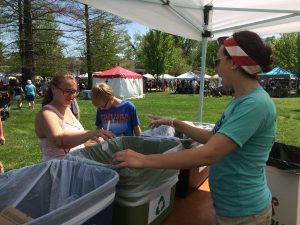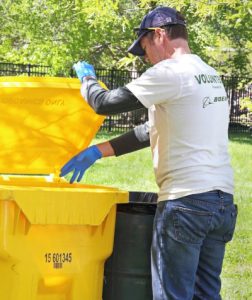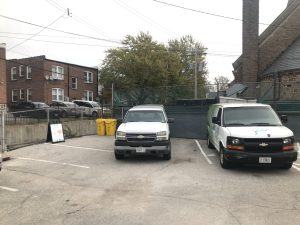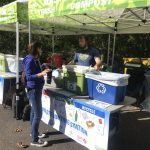Can Food Be Composted? & Other Tips on Composting
One of the most asked questions we hear is, can I also compost the food? This is how disconnected our education is around living ecologically. Grow up on a farm and you understand that animals will eat your food scraps and food and plant material will be composted back into the soil by worms and microbes.

Our staff and volunteers are here with positive support to help festival attendees divert waste from the landfill through composting and recycling.
But at a music festival in St. Louis, the connection just isn’t quite that obvious for many people.
Total Organics Recycling hauls collected food waste from events, restaurants, schools and grocery stores to a St. Louis Composting facility where, within six months, the material turns into a wonderful soil amendment, which, when applied to lawns, gardens, and landscaped areas, helps mitigate climate change, saves on water use, reduces rain runoff and soil erosion, and helps plants grow and fight off diseases.
Click here for information about what food scraps and items are accepted in their yellow roll carts. This commercial composting operation, unlike what you would do in your backyard, can take dairy, leftover salad (even covered in oil and vinegar dressing) and some cooked meats and bones. They will even accept greasy pizza boxes that should not be placed in curbside “single-stream” (or “All-in-One”) recycling carts and alley dumpsters. Tip: tear off the clean cardboard and recycle that piece and then compost the greasy bottom.
Members of earthday365 have access to yellow roll carts for their residential food scraps. We do not want to take anything else but food in our yellow roll carts. No produce stickers from avocadoes and other fruits. No utensils or other serviceware and especially no glass, styrofoam or plastic bags.
Some people will use compostable bag liners which are acceptable. It is important to understand that the carton MUST BE LABELED “certified compostable” like these World Centric Bags. “Compostable” cups, food trays and utensils are just too confusing for most people to take the time to understand so we do not want any of this material dropped off in our yellow roll carts. Some lab-tested certified compostable serviceware doesn’t compost in the St. Louis composting facilities so they only recommend items from the Composting Manufacturing Alliance that are field-tested to compost in windrow outdoor piles.
See what I mean about how specific the requirements are for anything OTHER than food?
Do your part and learn how food can be composted and keep our soils free from contamination by only placing in the yellow roll carts the organic items that are accepted.

Put your food scraps in compost roll cart for hauling away to a compost facility.

Compost roll carts at 4125 Humphrey St.



